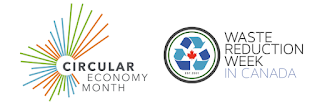So you want to think about making a big switch to reduce your climate footprint?
Here's some ideas on things you might consider doing. Many of them require some financial investment, or longterm planning.
To consider these choices, perhaps it's a good time to review the major sources of equivalent Carbon Dioxide (eCO2) emitters in Canada. (Review the 3rd graph in this old post)
1) Your Next Vehicle:
Transportation and the Oil and Gas Industry are the two top sources of CO2 emissions in Canada.
When looking to swap out or upgrade your vehicle, consider making fuel efficiency the most important feature. This could mean buying a slightly smaller vehicle, the most fuel efficient in a certain class of vehicle. If you're more determined, going for a hybrid, plug-in hybrid or a full electric is a better option for the climate. Hydrogen might become an option soon as well.
Overall, these vehicles can be more expensive to buy, but they do offer long term savings. Here's a chart with some vehicles of various sizes to help you compare annual fuel costs/savings.
There has been some discussion about the environmental cost of producing electric vehicles compared to their gasoline equivalents. The climate cost of producing an electric vehicle is about 10MT of eCO2, while the cost of producing a new gasoline vehicle is about 5MT of eCO2. This makes it look like an EV is not a 'greener' option. However, every year a gasoline car continues to product about 5MT, where an electric vehicle only produces about 1MT or less depending the source of the electricity. The long term savings of electric vehicles are definitely present.
There is a very simple way to reduce your emissions starting tomorrow as well: Car-pool. Car pooling can reduce much of your driving emissions by 50% without changing your vehicle.
NOTE: these numbers are just approximate and vary widely based on factors like the size of vehicle, driving style, range each year and how modern the production plants are.
2) Buying Things & Transportation
Transportation and shipping is a major industry, and with the dawn of online shopping this has become even more apparent. Even with 'Green advances' predictions say that emissions will still likely go up in the near future.
The vehicles and fuel required to move all these goods around the globe are staggering. Companies are now looking at high tech options to simply this such as 'driverless cars.'
Overall, it is very difficult to manage a reduction of CO2 emissions as a consumer, but it can be done.
This is not for everyone, but suggestions to have an impact in this area include things like:
- Buy less products (reuse & repair things more often)
- Buy local products
- Grow your own food
- Buy Canadian products
- Make do with less and live simply.
Putting some thought into your consumer habits and making some changes can still have an impact.3) Home Heating System
How we heat our homes is likely the third most impact we can have on Climate Change. On Manitoulin we have many homes burning wood to heat their homes through the winter. The efficiency of wood stoves isn't as high as some alternatives, but wood is a natural, renewable, local resource - so it's an overall 'green' choice.
The option with the least about of carbon dioxide released is likely electricity. In Ontario, we are well positioned with a system that produces electricity from sources that release little GHGs. This means that as we use electricity we are generally choosing an option that's helpful to the climate. Modern electric options are available as well, such as heat pumps (see Green Event 2022 post).
After these two options, propane and natural gas are overall better than oil, but all three are fossil fuels (a non-renewable resource) and produce GHG's with their combustion, and delivery. A new furnace is still better with these power sources so that efficiency will go up. Be warned that the federal climate tax will be going up on these options.
Another solid option is to insulate your house as best you can. Updating windows and doors helps, along with adding more insulation in attics, walls and basements. There is a good federal grant program that will help with the costs of upgrading.
Lastly, it's also an option to just turn down the heat when possible. Maybe that can be at night, when you're away, or just by 1˚ or 2˚ throughout the winter. Sweaters help keep you warm!
Summary:
When it comes to reducing CO2 emissions, the rule is still the same Reduce, Reuse, Recycle, but also ReThink! Finding ways to consume less gas in our vehicles, requiring less travel for our food and other goods, along with improving our home heating are all significant ways to help reduce emissions and mitigate the coming challenges of climate change. Every decision you make can make a difference to the overall emission numbers.
Lastly, remember to talk to others about the issue. Spreading the word will help everyone reduce their emissions and find options that work for their lives.
NOTE: if you want to get more creative, you can also invest in 'Green' options such as solar power in Africa.



